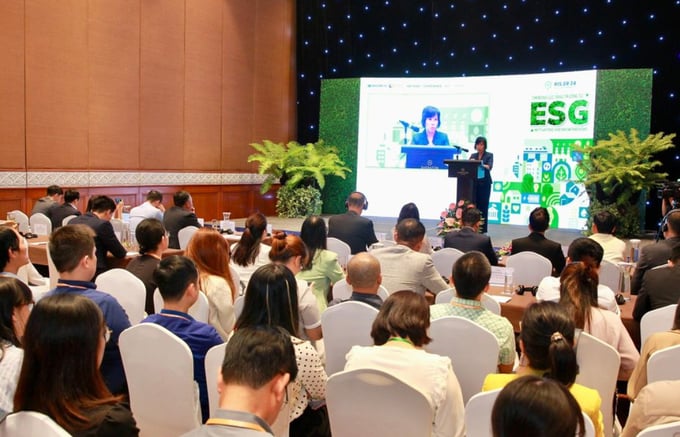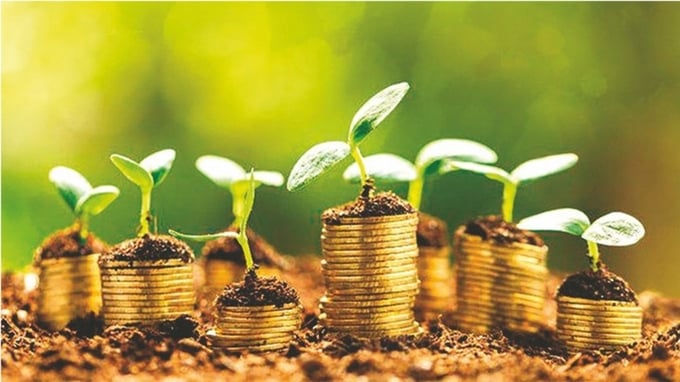May 30, 2025 | 04:30 GMT +7
May 30, 2025 | 04:30 GMT +7
Hotline: 0913.378.918
May 30, 2025 | 04:30 GMT +7
Hotline: 0913.378.918
On May 23, the seminar "Finding growth motivation from ESG" organized by Investment Newspaper and WBS Company attracted many participants from essential domestic and foreign managers, experts, and businesses to focus on "green" growth and sustainable development.
At the forum, Mrs. Nguyen Thi Bich Ngoc, Deputy Minister of Planning and Investment, said that in the green growth journey, ESG is a set of measurement standards to evaluate the sustainable development of businesses. Because in addition to profits, businesses must also pay attention to environmental and social factors.
Large businesses are now realizing that promoting and complying with ESG not only helps them develop sustainably but also creates long-term benefits for shareholders and the community.
This set of ESG standards is quite new to the Vietnamese business community. Green energy, green production, green growth are important factors in increasing the ESG index to help businesses develop and increase competitiveness in the export sector. Around the world, applying ESG is a trend among businesses.
As one of the countries heavily affected by climate change, weather developments always have a substantial impact on both agricultural output and the area of cultivation and livestock raising in Vietnam.
In the context of climate change and environmental pollution becoming increasingly unpredictable, sustainable development and ESG practices in agricultural production and agricultural product processing are increasingly focused on by Vietnam.
More and more businesses have been and are continuing to make efforts to reduce carbon emissions and waste, using socially responsible inputs, to meet the ESG criteria that are becoming increasingly important in the eyes of investors and consumers.

The seminar "Finding growth motivation from ESG".
Mr. Nguyen Tu Anh, Director of the Center for Economic Information, Analysis and Forecasting (Central Economic Committee), said that green transformation must originate from the awareness of the business community and the people.
"ESG standards are the scale of measuring the true value of a business. Implementing ESG not only makes businesses feel that their successes are more meaningful, larger, and more inclusive but also makes it easier for businesses to succeed in a context where community awareness of social and environmental issues is increasing," Mr. Tu Anh stated.
According to Mr. Matthew Smith, Research Director of Yuanta Vietnam Securities Company, based on recent calculations, in the context of other business factors remaining unchanged, there will be less risk if the company has better ESG standards.
As one of the countries heavily affected by climate change, weather developments strongly impact both agricultural output and the area of cultivation and livestock raising in Vietnam.
In the context of climate change and environmental pollution becoming increasingly unpredictable, sustainable development and ESG practices in agricultural production and agricultural product processing are increasingly focused on by Vietnam.
According to experts on the path towards green agriculture, the most significant barrier besides awareness issues is high cost. Businesses need to see these as long-term, valuable investments in the future to move towards a more substantial shift in agricultural production activities.

The agricultural industry has great expectations when applying ESG.
In addition, the Government also needs to encourage and support businesses to carry out green transformation activities and strengthen and improve the capacity and awareness of both people and businesses to accelerate the green transition process.
At the same time, in the transformation journey, the role of technology is very important in determining success or failure when implementing ESG goals.
Except for public companies listed on Vietnam's stock exchange, which are required to publish annual ESG reports, other businesses that are not required to publish ESG reports still have business activities oriented towards sustainable development at different levels.
The development of ESG for Vietnamese businesses is facing many difficulties. Several organizations are currently using many sets of standards and indicators to evaluate the sustainable development of enterprises in Vietnam (CSI Sustainable Business Index; ISO26000 Standard; Vietnam Sustainability Development Index (VNSI),...), which creates certain difficulties for businesses in choosing and applying.
Businesses can also be at risk if they manage their ESG program poorly due to lack of experience and limited skills. The ESG implementation plan needs to be coordinated throughout the enterprise. If there is any failure or problem at any stage, it can lead to inconsistency and major impacts on the business. This is a difficult and contains many risks for businesses because of a lack of experience and limited ESG management skills.
Translated by Huong Giang

(VAN) Ms. Nguyen Thi Dung, Deputy Director of Ngoc Hoang Cooperative, shared about the journey of bringing dragon fruit to Europe, achieving annual revenues in the billions of VND.

(VAN) Bamboo products from Thang Tho Bamboo Cooperative have reached many countries around the world, while also creating jobs for local workers.

(VAN) The Management Board of Con Dao National Park reported that a green sea turtle, tagged in the Philippines, has traveled thousands of kilometers to lay 84 eggs on Bay Canh Islet.

(VAN) Green technology is paving a new path for sustainable aquaculture in the Mekong Delta in particular and across the country in general, helping reduce emissions and adapt to climate change.

(VAN) On May 27, La French Tech Vietnam (the French startup and innovation community in Vietnam) held the French Tech Summit Vietnam 2025.
/2025/05/27/4731-2-223159_980.jpg)
(VAN) No votive paper, no styrofoam, no plastic bags, no plastic bottles, and no single-use plastic trays are the key rules tourists should keep in mind when visiting Con Dao.

(VAN) In the fight against plastic pollution, Vietnam has been demonstrating a proactive, pioneering, and active role in addressing the greatest environmental challenge today.